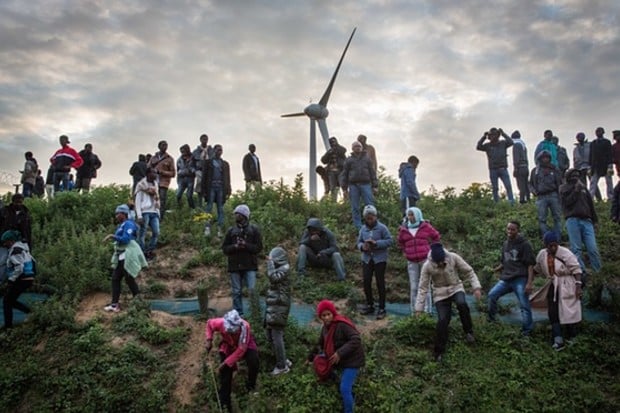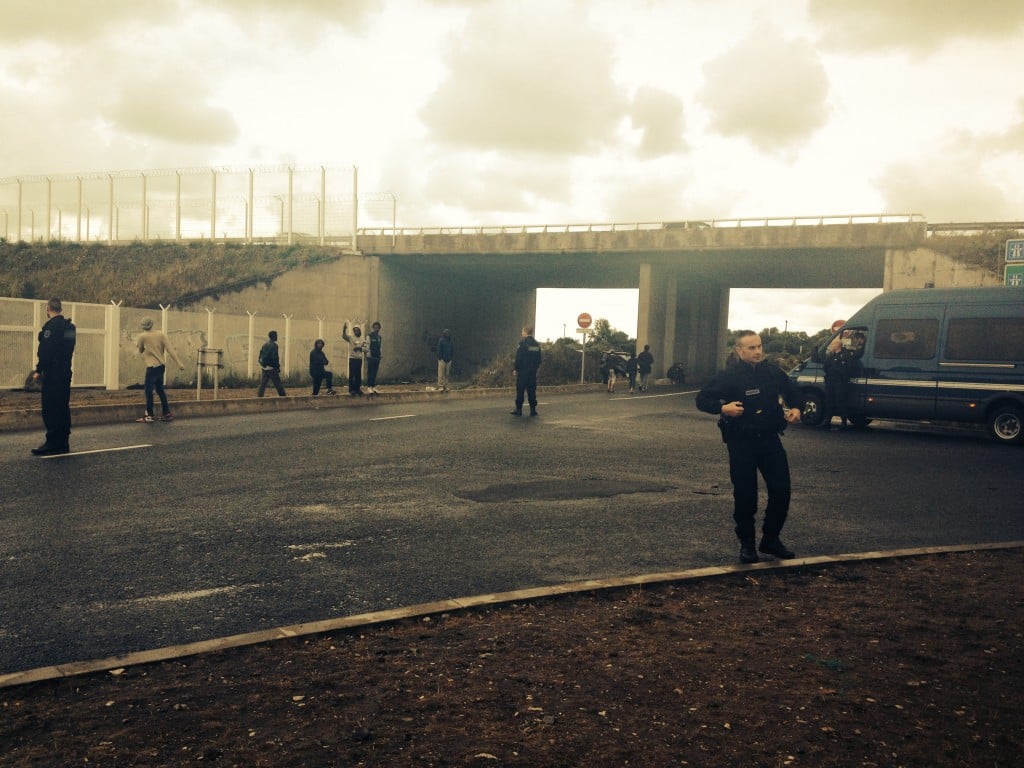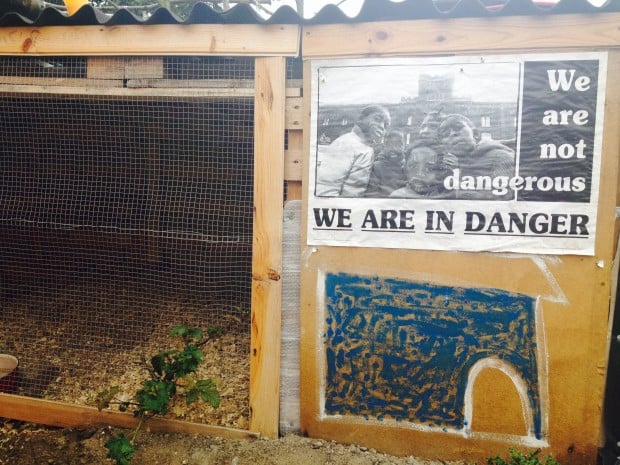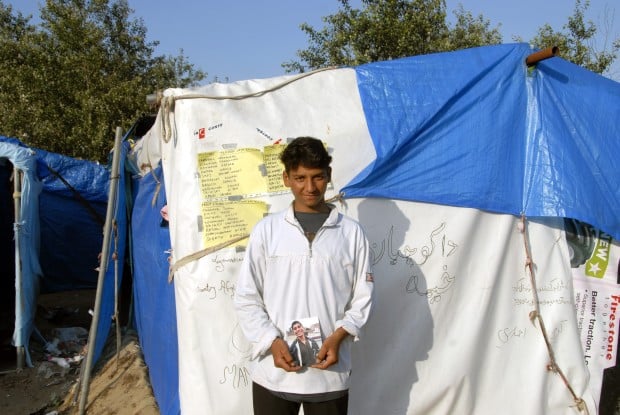 A team from London-based production company Gallivant Film recently visited the Jungle, an unofficial refugee camp that has emerged in recent months on the outskirts of Calais. There they met and interviewed some of the people whose journeys from war-afflicted homes have paused at the camp. Christy Cooney put questions about the film to its director and producer, Orban Wallace. Follow the link at the bottom of the page to help fund the film’s next instalment.
A team from London-based production company Gallivant Film recently visited the Jungle, an unofficial refugee camp that has emerged in recent months on the outskirts of Calais. There they met and interviewed some of the people whose journeys from war-afflicted homes have paused at the camp. Christy Cooney put questions about the film to its director and producer, Orban Wallace. Follow the link at the bottom of the page to help fund the film’s next instalment.
Describe the film for us.
We Are All People: Voices From Calais is a film which aims to amplify the voices of the people stuck in desperate circumstances on the doorstep of our country. It is a film about the day-to-day life in the Jungle and will give a human face to those who are misrepresented and de-humanised by the rhetoric of our politicians and mainstream media. It will tell their story. It is a film to remind us that we are all people.
How did the film come about?
The project came about very spontaneously and was inspired by people we knew who were running an aid convoy to Calais. As a filmmaker by trade and someone who has felt deeply troubled and touched by the situation, I suddenly had the realisation that I had the means and the capability to pull together a team, to make a film which could present a different perspective.
We put together an IndyGoGo campaign to help raise funds to cover the costs of shooting, managed to hire an amazing camera, and spent a week of late nights trying to work out the logistics. Time was of the essence; we wanted to get out there as soon as possible. The response to our fundraiser and the support and trust given to us by so many people was empowering and scary. We had no idea what to truly expect or if we would make the film we had envisioned.

What was it like arriving in Calais?
We set off feeling nervous and excited. Within a two hour drive from London and a short ferry journey, we were in the Jungle. It is home to around 3000 people, mostly from the war-torn countries of Sudan, Syria, Afghanistan, and Eritrea. The nervousness we felt entering this world quickly disappeared with the smiling faces, warmth, and hospitality of everyone we met. As conversation began to flow, we quickly became assured that what we were doing and the approach we wanted to take was one that hadn’t been told or seen. The stories, resilience, and hope of these people were overwhelming. We spent just four days and nights there and we only scratched the surface.
Do you think Europe’s response to the current migrant crisis has been adequate?
No. Europe seems to have been hiding away from the reality of the situation. We can’t pretend that what the European Union and its member states are doing is working. Migration isn’t going to go away. We are currently facing the largest movement of migrants since the Second World War and these are people who can’t return to the countries they have fled. Building fences, using tear gas and other forms of violence against migrants and asylum seekers will not stop migrants from coming or trying to come to Europe.
The EU needs to come together and work out a solution which looks to the future. We need to stop using dehumanising and hateful language of the kind that ignores the legitimacy of the asylum seekers’ and migrants’ claims to human rights. These are people just like you and me, and none of us have the moral high ground to say that we would never do the same if we were in their shoes.

What are you hoping to achieve with the film?
This film will be about connecting people on a human level to those who are in danger and living in subhuman conditions right on our doorstep. They want to come to England because, for most, English is there only other language. They want education, they want the ability to live without fear, the want to have a normal life. We have created a country people want to be a part of. We colonised the world and spread our language far and wide; we can’t just retreat when it suits us and deny others the option to a life they want.
We have a duty to work out a solution, which gives the people who are legitimately in need the ability to apply for asylum or migration. Every night they are risking their lives jumping onto trains and lorries just to see if they have a chance. Surely there is a better solution than this? Surely no-one has the right to deny another the chance of a better life?
We intend to premier the film in the Jungle in Calais and then put on a series of screenings in London, Dover, Calais and other cities in the UK. We intend to use these events to raise funds towards supplying aid to the people there. We intend to push the film towards UK broadcasters to see if it will be picked up. If it isn’t we will go for online publication.
What did you learn in the process of meeting migrants in Calais?
I learnt how fundamentally we are all the same. We all want to be happy. We all want a chance to live a life where we feel free. However what I left with was an unsettling feeling of how deeply unfair the world is and how, because of the choices of a few, many will never be allowed the life they want to live. Simply because of the colour of their skin or the country they were born. It made me feel angry that I come from a country where our elected leader could be so small-minded and inhumane. We, however, as free-minded citizens, do have a duty and the empowerment to make a difference if we choose too.

How important are aesthetics when producing a political film?
Filmmaking is an art, which has an incredible power to inform. When mixed with a creative and visually engaging aesthetic I believe it has the power to truly touch people. Our approach for this film was to move away from the traditional form of informative documentary making, with talking heads and a narrator’s perspective, and let the story simply be told by the people there.
Many who didn’t want their faces filmed gave interviews with just sound. Not having the camera present actually allowed a much deeper connection to the interviewee and allowed us to capture some very powerful accounts of life in the Jungle and their stories. We wanted the film to play more like a short film and we have bookended it around one character we met.
The sound design will incorporate the stories and the rich soundscape of the place and will play out against the bustle of life there and the surreal environment of Europe’s very own refugee camp. Our artistic approach to this film was to try and give it reach beyond the sphere of political documentary and it’s associated audience. This is a film that needs to be seen by many.
What next?
I have decided to make the film feature length and will travel out to shoot the first two chapters. I will go to Greece where up to 3000 people are still arriving by boat daily. I will then follow their journey through the Balkans to Hungary where fences are being built to stop the migrants getting through. It feels like we have begun something with our film in Calais, but the story starts earlier and I want to capture that.
We need everybody’s help to reach and exceed our campaign goal to help with the costs of shooting this next leg of the journey, premiering the film in the Jungle, and showing the film at screenings across the country.
You can help the team at Gallivant tell the stories of the migrants in Calais by contributing to their IndieGogo fundraising campaign here: https://www.indiegogo.com/projects/we-are-all-people-voices-from-calais#/story
Filed under: Film, TV & Tech, Politics

Comments